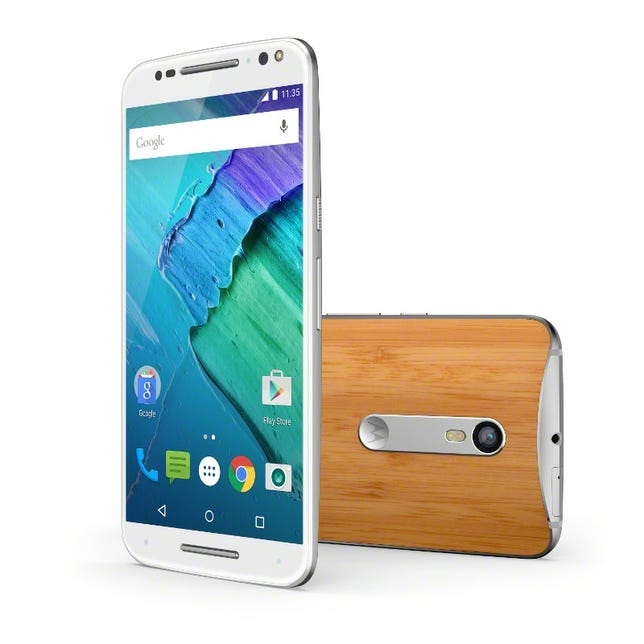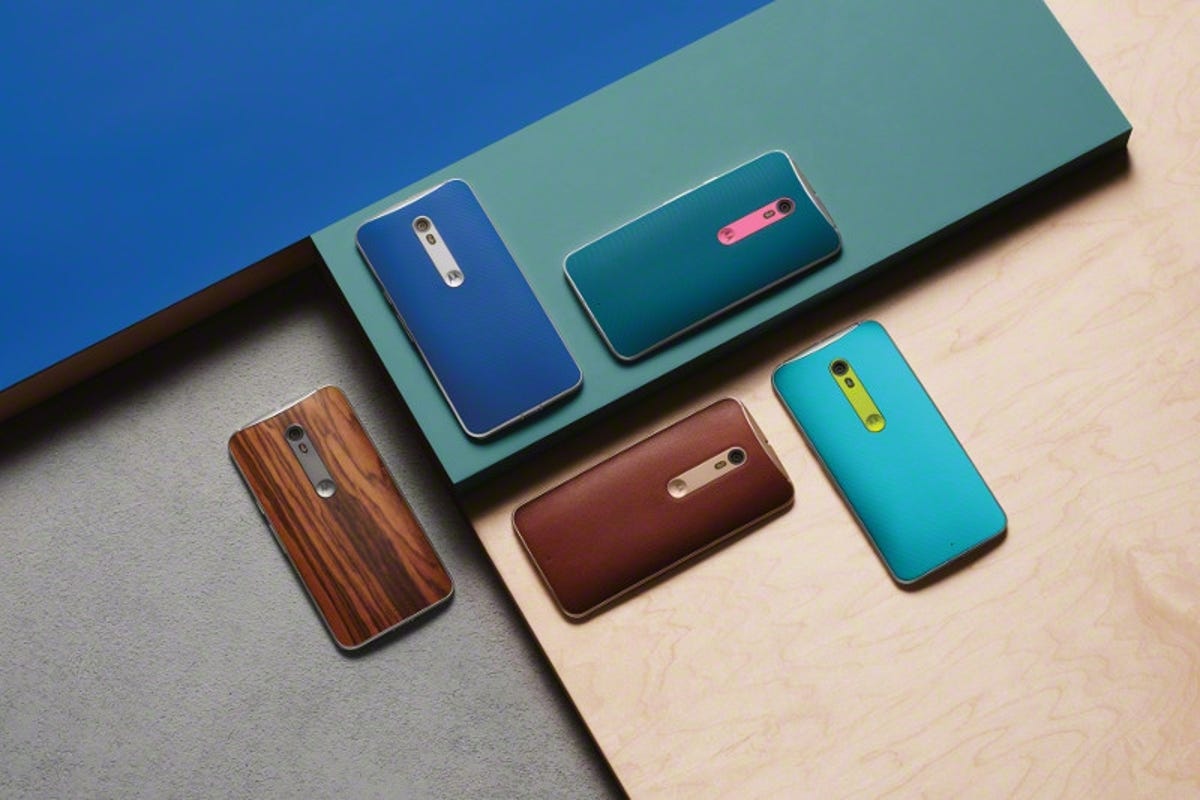
Motorola
Motorola is betting that consumers will want its next big smartphone enough to seek it out for themselves.
The company on Tuesday unveiled two variants of its Moto X flagship smartphone, the smaller (albeit still large) Moto X Play , intended to hit several markets outside of the US, and the larger Moto X Style, available virtually everywhere. In the US, the Style will be known as the Moto X Pure Edition and retail for $399.
While both smartphones introduce the typical upgrades — higher quality display, better camera and long battery life, among other features — the biggest difference could be how Motorola will sell the Style in the US. Rather than the typical route of partnering with the carriers, Motorola will go at it alone and sell it through its own website.
Motorola is just the latest company to opt for a direct-to-consumer approach, a strategy embraced by Chinese vendors such as Huawei, ZTE and Alcatel OneTouch. These companies believe a growing number of consumers will research and buy phones online. The key advantage for Motorola, itself a subsidiary of Chinese vendor Lenovo, is its brand presence in the US.
“The Motorola brand remains strong,” said Jeff Miller, head of sales for Motorola. “That’s something we intend to leverage.”
Motorola’s new phones
- Motorola doubles down on Moto X with Style, Play, updates Moto G
- Moto X Pure/Style packs 20-megapixel camera into a larger, wildly customisable body
- Moto X Play is a 5.5-inch, budget-minded globally-targeted smartphone
- New Moto G adds 4G LTE, 13-megapixel camera for $180
Still, it’s unexpected move for a company that has historically partnered with the big carriers for exclusive deals, including its relationship with Verizon for its Droid smartphone franchise.
“It’s unusual for a flagship to be offered exclusively through retail non-carrier channels,” said Ross Rubin, an analyst at Reticule Research.
For the US market, Motorola created a unique version of the Style that can work on any US carrier’s LTE network. That’s an important distinction because most unlocked smartphones entering the US tend to work with AT&T and T-Mobile, but not necessarily Verizon Wireless or Sprint because of wireless technology differences.
Even Apple’s iPhone 6 is split into three models capable of working with different network technologies and frequencies. A T-Mobile-compatible iPhone, for instance, may not be able to take advantage of the fastest network speeds offered by Sprint.


Motorola
Motorola’s new US Style phone allows you to easily switch between carriers — something the company felt was key for a direct-to-consumer strategy. “We focused on the ubiquity of the device,” Miller said.
The Moto X Style, or Pure Edition, follows a few other smartphones selling online. Earlier this month, ZTE unveiled its new flagship smartphone family name — the Axon — and said it would sell the Axon Pro directly to consumers for $449.98 without a contract. In June, Huawei introduced the P8 Lite, priced at $250 without a contract, which it sells on its own website.
Motorola’s new phones 2015






+15 more
The Chinese vendors are going directly after consumers because US carriers have been reluctant to highlight their high-end smartphones. The carriers are largely interested in stocking cheaper smartphones, as less price-conscious consumers gravitate largely toward Samsung’s Galaxy S line or Apple’s iPhone family.
“We’ve got to do something different,” ZTE US CEO Lixin Cheng (no relation to this writer) told reporters at an event earlier this month.
Without carrier stores to showcase their best devices, the vendors are looking to online as a way to make a name for themselves. Chinese smartphone startup Xiaomi has boosted its market share and global presence by holding limited online “flash sales” that drum up attention for its products.


ZTE
It’s a curious turn for Motorola, though, because the company already had a healthy relationship with the US carriers. Its standing with the like of Verizon Wireless and AT&T, for example, is one of the reasons Lenovo said it purchased Motorola from Google.
Like the other smartphone vendors, Motorola believes this is a group of consumers that will keep growing. The carriers’ decision to separate the cost of the device from the service charge has shined a spotlight on the true cost of smartphones. Previously, signing a two-year service contract would allow you to buy an iPhone for $200. But under the carriers’ new model, consumers are on the hook for the full retail price of $650 — albeit under monthly installments.
Carriers like AT&T offer service fee discounts if you bring a smartphone you’ve purchased yourself — and that has opened the market for unlocked smartphones. Motorola is banking on the fact that the high-end features and $399 price of the Moto X Style will give it an edge.
The Moto X Style boasts a 5.7-inch edge-to-edge display, dual front facing speakers, a 3,000 mAh battery that can quickly be recharged, a 21-megapixel rear camera and a 5-megapixel front-facing camera with its own flash.
As with its other marquee smartphones, the Moto X Style will work with Motorola’s Moto Maker website, allowing users to customize the look of the device and the material of the backing.
Still, it’s unclear how big of a market Motorola will be able to tap by eschewing the traditional carriers. It won’t benefit from carriers’ marketing support or shelf space in thousands of carrier stores.
“This is a small segment of the market right now,” said Avi Greengart, an analyst at Current Analysis, following the ZTE Axon unveiling. “Consumers are going to need an overwhelming push to change.”
For its part, Motorola hopes its recognizable brand will give it a fighting chance.
“We’ve got a good chance to stand apart in this area — and lead,” Miller said.



